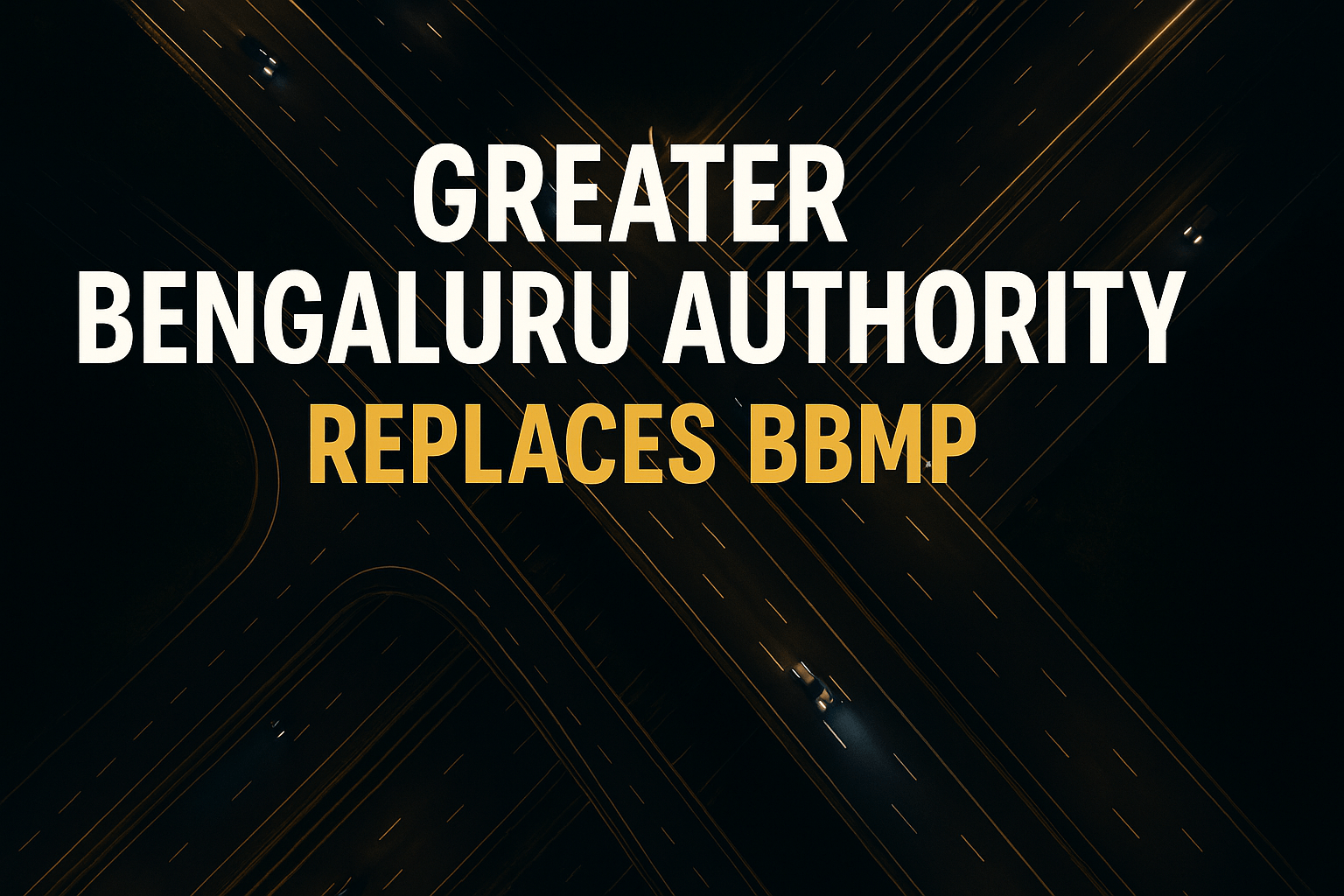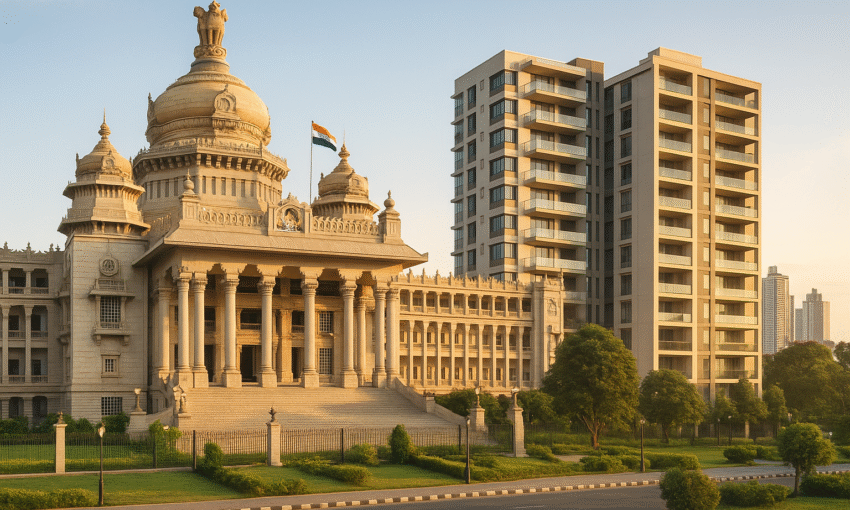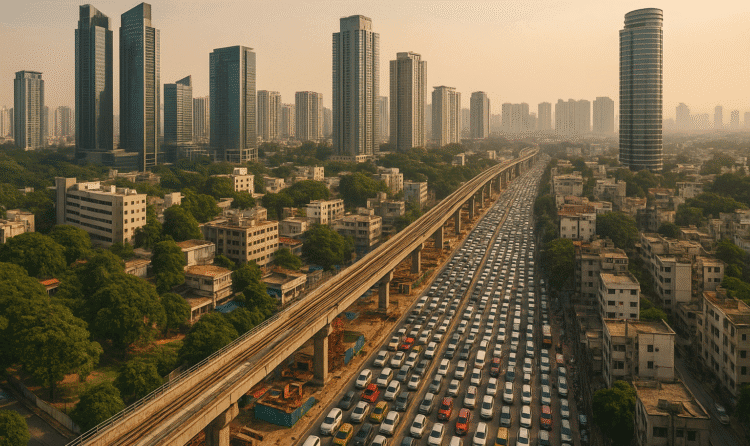Greater Bengaluru Authority Replaces BBMP: What It Means for the City
In a sweeping reform of Bengaluru’s urban governance, the Karnataka government has approved the creation of the Greater Bengaluru Authority to replace BBMP . This move aims to modernize the city’s administrative framework and address the increasing demands of its fast-growing population.
Bengaluru has long grappled with issues of civic mismanagement, traffic congestion, and sluggish infrastructure development. With the introduction of the Greater Bengaluru Authority, the government hopes to build a more efficient, transparent, and citizen-focused governance model.
But what does this mean for everyday citizens and the city’s future? Let’s break it down.

Background on BBMP: Why the Transition Was Needed
he BBMP was established in 2007 to manage civic affairs in Bengaluru. As the city’s official municipal corporation, its responsibilities included roads, waste management, property taxes, water, and public health.
However, BBMP was often criticized for:
Inefficiency in service delivery
Corruption and lack of transparency
Poor coordination among departments
Inability to scale with Bengaluru’s rapid growth
Multiple studies and citizen forums highlighted these gaps, paving the way for a BBMP replacement strategy.
According to an article in The Hindu, the government decided to act after receiving recommendations from several urban planning think tanks, including the Indian Institute for Human Settlements (IIHS).
What Is the Greater Bengaluru Authority?
The Greater Bengaluru Authority is a new, centralized civic agency set to overhaul how the city is governed.
Greater Bengaluru Authority Powers and Functions:
- Oversee urban planning, zoning, and infrastructure development
- Integrate metro, water, waste, and electricity planning across departments
- Deploy real-time monitoring through smart dashboards
- Issue approvals for construction, occupancy, and compliance
- Coordinate with BWSSB, BDA, BMTC, and BESCOM
The authority aims to provide data-driven governance, citizen-first solutions, and streamlined execution of mega projects. Its design follows global models seen in cities like Singapore and Barcelona.
Greater Bengaluru Authority vs BBMP: Key Differences
| Aspect | BBMP | Greater Bengaluru Authority |
|---|---|---|
| Structure | Decentralized wards | Unified, central agency |
| Efficiency | Sluggish execution | Real-time, tech-based oversight |
| Transparency | Limited accountability | Dashboards, public data access |
| Coordination | Poor inter-agency links | Integrated infrastructure approach |
| Public Participation | Sporadic | Ward-level engagement committees |
This BBMP transition marks a decisive shift towards long-term city planning and governance predictability.
Impact of Greater Bengaluru Authority on Bengaluru Residents
How does this impact people living in the city?
1. Faster Services
Expect speedier approvals for building plans, utilities, and civic complaints.
2. Better Infrastructure
Planned road networks, metro connectivity, and drainage systems across newly integrated zones.
3. Higher Property Values
Improved governance will likely drive appreciation, especially in suburban areas.
4. Lower Bureaucracy
Single-window clearances and digital services will reduce delays and red tape.
5. Greater Accountability
Regular performance audits and citizen reporting platforms will empower residents.
These changes reflect the Impact of Greater Bengaluru Authority on Bengaluru residents and aim to enhance daily urban experiences.
Future of Bengaluru’s Urban Governance
The Greater Bengaluru Authority is expected to become a model for Bengaluru urban governance, introducing:
Digital twin infrastructure to simulate city planning
Real-time traffic and weather analytics
Collaborative apps for residents and ward officials
Experts from the Indian Express suggest that Bengaluru’s success could inspire similar models in other Indian metros.
However, the authority must:
Ensure inclusivity for low-income groups
Tackle urban sprawl and environmental issues
Prevent centralization from stifling local voices
Overall, this could be the beginning of Bengaluru’s evolution into a truly smart, equitable city.
The GBA oversees planning, infrastructure, and service delivery by integrating agencies and using digital tools for better governance.
Due to inefficiencies and lack of coordination, BBMP could not manage the city's growing needs, prompting its replacement.
It includes zoning, infrastructure management, issuing permits, and implementing smart city features.
Although not confirmed, unified tax assessments may follow, possibly offering more transparency and efficiency.
Peripheral regions like Sarjapur, Yelahanka, and KR Puram are likely to benefit most from integrated planning.




